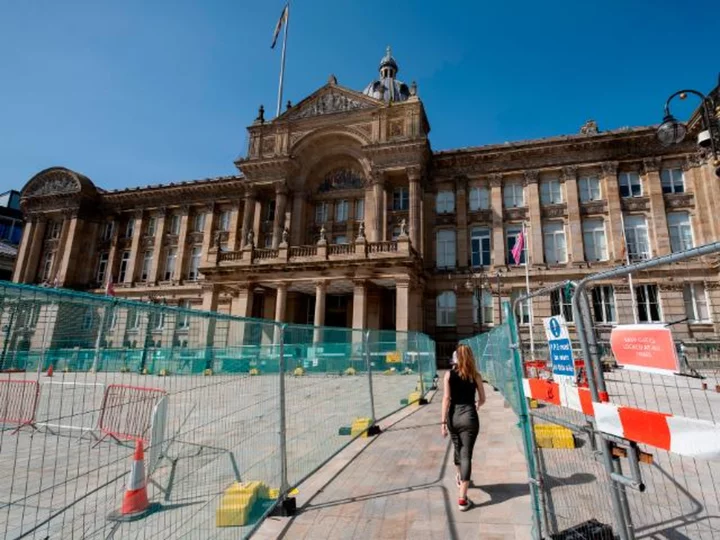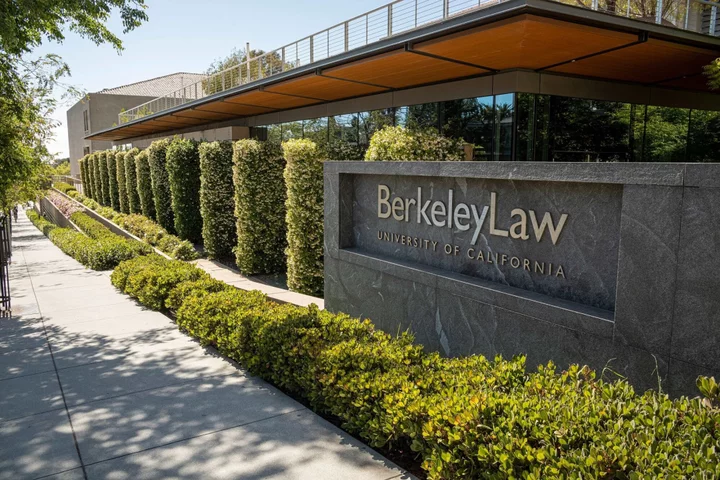Birmingham — the biggest British city after London — is in dire financial straits.
The city's council is one of a growing number of local government authorities in the United Kingdom making, or considering, painful spending cuts as a result of insufficient funds.
Birmingham's effective bankruptcy is uniquely tied to hefty compensation claims it has had to pay former female employees who were historically paid less than men for similar work.
But it is not alone in facing a serious funding shortfall, which is partly a symptom of deep cuts to central government spending over the past decade that have left Britain's public services, including schools and hospitals, in a state of disrepair.
"Local government is facing a perfect storm," Sharon Thompson, Birmingham City Council's deputy leader, said in remarks broadcast Tuesday. "Like councils across the country, it is clear that this council faces unprecedented financial challenges, from huge increases in adult social care demand and dramatic reductions in business [taxes], to the impact of rampant inflation."
The council said it would have to effectively declare bankruptcy because it had no more money to cover compensation awarded to former female staffers, which have been draining its coffers for years.
That left it with no option but to issue a so-called section 114 notice, which means it will need to halt all spending except on essential services, such as schooling, housing, social care, waste collection and road maintenance.
How Birmingham went bust
Thompson blamed Birmingham's financial troubles partly on an outstanding legal bill pertaining to the equal pay claims, which resulted from a Supreme Court ruling in 2012. The bill amounts to between £650 million ($810 million) and £760 million ($950 million), based on the council's current estimates.
The original case was brought by 174 former council employees, all except four of whom were women.
The group, which included cleaners, cooks and care staff, alleged they were denied bonuses and other payments made to men who were doing work of equal value. They argued that this breached the equality clauses of their employment contracts under the Equal Pay Act of 1970 — and the court agreed. Hundreds more workers have since made similar claims.
The council has already burnt through £1.1 billion ($1.4 billion) over the past decade to settle these claims and now expects to have a budget deficit of £87 million ($109 million) for the 2023-24 financial year.
"[The legal bill] is one of the biggest challenges this council has ever faced... It means there will be significantly fewer resources available in the future compared to previous years and we will need to reprioritize where we spend taxpayers' money," it said in a statement in June.
More councils at risk
Most areas of England have two tiers of local government, namely county councils — which cover regions of the country such as the West Midlands or Yorkshire — and district, city or borough councils.
London, because of the vast size of the population, has borough councils, which oversee service delivery for a cluster of the city's neighborhoods.
Councils derive the majority of their income from taxes on residents and businesses, as well as from central government funding grants.
Alongside the equal pay claims and the costs of installing a new IT system, Thompson of Birmingham City Council also blamed the city's downfall on the "£1 billion of funding taken away by successive Conservative governments."
When the UK government adopted an austerity program in 2010 on the heels of the global financial crisis, it slashed funding to local councils.
According to the National Audit Office, government funding to local authorities in England dropped by more than 50% between the 2010-11 and 2020-21 financial years.
In a statement, Shaun Davies, chair of the Local Government Association, said councils faced a funding gap of almost £3 billion ($3.8 billion) over the next two years "just to keep services standing still."
"The government needs to come up with a long-term plan to sufficiently fund local services," he added.
Not about to default
A spokesperson for UK Prime Minister Rishi Sunak told reporters Tuesday: "Clearly it's for locally elected councils to manage their own budgets."
DBRS Morningstar, a credit rating agency, said in a note Wednesday that Birmingham's financial distress didn't mean it was about to default on payments to private creditors, which account for just 25% of the city's liabilities. About 65% are made up of loans from the UK Treasury; other creditors include UK local governments.
"We believe that the ability of Birmingham City Council to honor its debt due to private creditors will mainly depend on the support that will be granted by the UK government and the behavior of other local authorities," said Mehdi Fadli, senior vice-president of global sovereign ratings at DBRS Morningstar.
Several other local councils have already declared themselves effectively bankrupt in recent months — including those in Croydon, part of greater London, and Woking, a town just south of the capital.
And Birmingham is unlikely to be the last. A recent survey by the Special Interest Group of Municipal Authorities — a lobby group representing 47 urban authorities in England — found that 30% of its members are worried that they, too, face the risk of bankruptcy this year and next.
"The funding system is completely broken," SIGOMA chair said in a statement last month. "Councils have worked miracles for the past 13 years, but there is nothing left."









